Hospitality industry joins ESG
At the ceremony to honour businesses that have made positive contributions towards the criteria (ESG), Muong Thanh Hospitality Group, The Grand Ho Tram Strip, and TUI Blue Nam Hoi An were among nearly 40 businesses to pick up an accolade.
According to Anton Bespalov, general manager of TUI Blue Nam Hoi An, the award was a recognition of the resort’s efforts and commitment to promoting sustainable development, something they have been committed to for many years.
“Visitors now want to use tourism services associated with sustainability,” said Bespalov. “TUI Blue Nam Hoi An has outstanding activities related to saving energy and water, cleaning up the beach, and contributing to the local economy. We also inform our guests on ESG topics, encouraging them to work together to create a memorable stay.”
| Anton Bespalov - General manager TUI Blue Nam Hoi An
Green tourism in both real estate and hospitality businesses is seeing more demand from the consumer perspective, travel professionals, booking agencies, and tour operators, which are all more interested in providing green experiences and responsible tourism. Hospitality is more in demand. After some evaluation, it seems the time to move in the right direction. We need more effort from all businesses. Here we’re in the same boat, and we have no competition. We need to combine efforts to achieve better results and share best practices, with strong support from the government. We need more environmental education and awareness to encourage people to follow best practices, such as green tourism. Most of my colleagues from the group, and different brands and companies, are very much involved in that. So it’s not just because we have key performance indicators in our monthly, quarterly, and yearly valuations – but also because it’s my personal belief that by taking these actions, we are providing a better green experience and making the world a better place. |
Meanwhile, Archipelago International, the largest independent private hotel management group in Southeast Asia and which operates around 150 hotels in the region, has also made strong commitments to sustainability criteria since its launch in Vietnam earlier this year.
Norbert Vas, vice president of development at Archipelago, said that practising ESG and implementing programmes to promote sustainable development would cost businesses a significant amount of money. But in the long run, it would be advantageous to help the brand gain customer support, especially with green and sustainable tourism becoming a trend.
“Six years ago, we decided to eliminate all plastic straws and water bottles from hotels in Indonesia. Both customers and investors initially opposed this change, but they have gradually accepted it over the years when seeing the growth in business results and the effect it has on the environment,” Vas said.
Meanwhile, Dr. Su Ngoc Khuong, senior director of Savills Vietnam said, “The trend of sustainable hotel investment and operation according to ESG criteria exploded strongly after the pandemic and will remain even after that is longer a hot topic.”
He said the tourism industry had just begun to recover, and so businesses are still putting financial issues higher than the sustainability problem. But in the future, ESG standards will be a top priority in tourism, resort real estate, and hotels, Khuong insisted.
According to the World Tourism Organization, the hotel industry is responsible for 1 per cent of total global carbon emissions and is rising.
An analysis of the carbon emission index of more than 15,000 hotels globally released by CBRE in October shows that in the Asia-Pacific region, carbon emissions per hotel room are among the highest in the world. Countries that rank high on the list include Indonesia, Malaysia, India, and South Korea.
To meet the Paris Agreement sustainability goals, the global hotel industry needs to reduce carbon emissions by 66 per cent per room by 2030 and 90 per cent by 2050. Leading brands in the sector have committed to reducing their environmental impact by setting development goals based on climate issues.
 |
| Hospitality industry joins ESG, Photo: TUI Blue Nam Hoi An |
In Vietnam, many customers, investors and even hotels increasingly emphasise ESG criteria when making decisions and formulating strategies.
Traveloka, the largest online booking application and travel services in Southeast Asia, also attaches importance to this. Huynh Thi Mai Thy, Vietnam country manager of Traveloka said, “Sustainable tourism not only focuses on environmental protection but also has a more profound understanding of what tourists can do.”
According to an internal assessment of the Traveloka system, 46 per cent of users are interested in how their trip will affect the environment, society, and culture. “We are building an ecosystem of smart, sustainable tourism development with the support of the Vietnam National Administration of Tourism to accompany and promote sustainable tourism development,” Thy added.
| Dennis Ng Teck Yow - General director, Gamuda Land Vietnam
We have rolled out the Gamuda Green Plan, which was established with a strong initiative to become a platform and a clear vision with achievable deliverables and key drivers. This is meant for large-scale urban development that meets international standards. But it doesn’t come overnight; it requires massive planning. We have established a plan that works towards sustainability, which we can use to move through the next 10-15 years. Through the 80-hectare Gamuda established today, with a population close to more than 16,000 people, it has actually helped to create an ecosystem by itself. The green plan that we established is very important, especially as we move to a larger scale. After the first phase of communal gardens is implemented, we’re moving on to the second phase of our central development. The second step of what we are aiming for is establishing strategies that complement our master plan, and going forward with how we actually implement social compliance and requirements. Ling Foong - Head of Sustainability Frasers Property Vietnam
Multinational real estate firms such as ours are in a privileged position to play a major role in reducing our carbon footprint. This is in line with our shared purpose of inspiring experiences and creating places for good. We want to be a part of creating a society and cities that will last and thrive for generations to come. Every three years, we create new targets regarding what we need to do in terms of ESG considerations. We completed our first phase and achieved all our goals over the past three years. Internally, we are also committed to the Task Force on Climate-related Financial Disclosures on all our climate research and investment climate risk assessment for all our funding decisions. We have also set a target for all our properties to be green-certified. We did a lot of groundwork where we had a set of minimum criteria for all our investments in terms of energy efficiency, water usage, utility usage, and waste generation. |
 | Private businesses admit uphill task to implement ESG Although many private businesses want to implement environmental, social, and governance criteria, lack of finance and knowledge is a major barrier to their ambitions. |
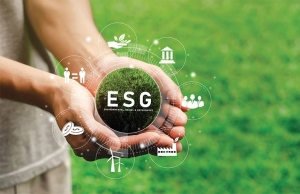 | VIR standing by businesses in sustainable development Vietnam Investment Review will this week host a recognition ceremony to offer appreciation to both domestic and foreign groups that have supported the country’s sustainable development and corporate social responsibility initiatives over the past five years. |
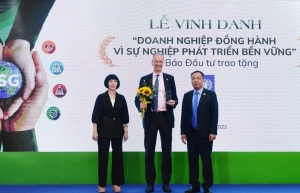 | VIR honours sustainable businesses in Vietnam Nearly 40 local and foreign businesses that have supported Vietnam’s sustainable development and ESG/CSR initiatives over the past five years have been honoured by VIR within the framework of the conference "ESG: The key to sustainable development". |
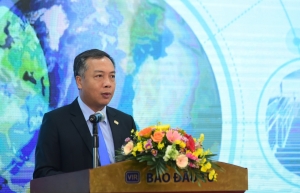 | ESG key to sustainable development: conference On November 29, the “ESG - The Key to Sustainable Development” conference, organised by Vietnam Investment Review (VIR), saw the attendance of about 100 guests from state agencies, speakers, press and media agencies, and nearly 40 enterprises in Vietnam. |
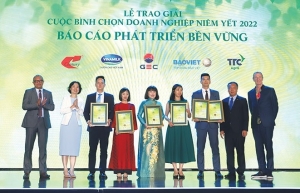 | Listed companies lean into ESG conventions The mounting acceleration of sustainability and ESG-related criteria have been among the major concerns among financial markets, and Vietnamese organisations are allocating more resources towards improving their resilience. |
What the stars mean:
★ Poor ★ ★ Promising ★★★ Good ★★★★ Very good ★★★★★ Exceptional
Related Contents
Latest News
More News
- Sheraton Phu Quoc rolls out Lunar New Year 2026 cultural and dining programme (February 11, 2026 | 09:00)
- Fairmont opens first Vietnam property in Hanoi (February 04, 2026 | 16:09)
- Marriott signs major deal to expand luxury hotel footprint in Vietnam (February 04, 2026 | 15:58)
- Welcome Year of the Horse at Four Seasons Resort The Nam Hai (January 30, 2026 | 16:18)
- The Grand Ho Tram to host the first-ever IBF convention in Southeast Asia (January 29, 2026 | 12:18)
- Danang Marriott ushers in Lunar New Year by the sea (January 28, 2026 | 11:42)
- Angsana and Dhawa Ho Tram offer a serene Lunar New Year retreat (January 23, 2026 | 23:38)
- Tides of Heritage: A Tet speciality at InterContinental Phu Quoc Long Beach (January 20, 2026 | 12:08)
- Muong Thanh launches Lunar New Year gifts inspired by tradition (January 16, 2026 | 16:41)
- The Grand Ho Tram seeks responsible entertainment with pilot casino access (January 16, 2026 | 10:56)


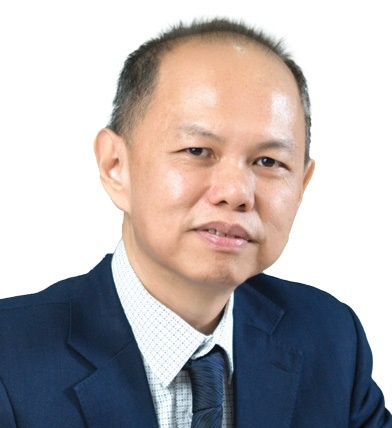

 Tag:
Tag:


















 Mobile Version
Mobile Version